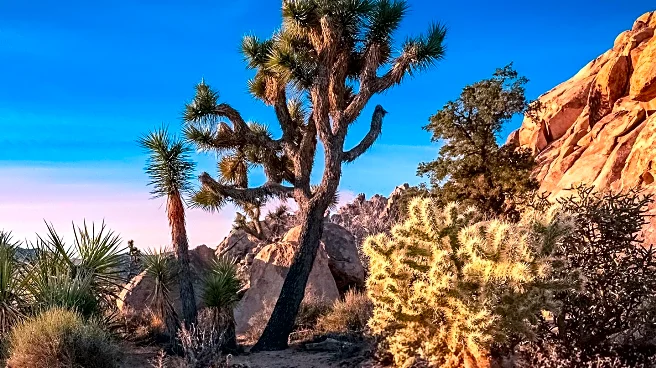What's Happening?
The lodging landscape around Joshua Tree National Park has evolved significantly, with a new wave of unique hotels catering to diverse traveler preferences. Historically, options were limited to budget
hotels and camping, but the rise of Airbnb in the early 2010s expanded accessibility, albeit with challenges for local housing markets. Recently, entrepreneurs have introduced distinctive hotels such as the Hotel Wren, Field Station, and Reset Hotel, each offering specialized experiences. Established venues like Campbell House Inn and Hicksville Trailer Palace continue to celebrate their niche identities, providing varied experiences from traditional bed and breakfasts to themed adult playgrounds. This shift reflects a broader trend towards personalized travel experiences, appealing to a wide range of visitors.
Why It's Important?
The transformation of lodging options near Joshua Tree National Park highlights a significant shift in the travel industry towards personalized and unique experiences. This trend is crucial for the local economy, as it attracts a diverse array of tourists, potentially increasing revenue for the area. However, it also underscores the challenges faced by local residents due to the impact of short-term rentals on housing affordability. The new hotel offerings provide alternatives that may balance the demand for unique accommodations with the need for sustainable tourism practices. This evolution in lodging options could serve as a model for other tourist destinations facing similar challenges.
What's Next?
As the short-term rental market stabilizes, the focus may shift towards ensuring sustainable tourism practices that benefit both visitors and local communities. Entrepreneurs and local authorities might collaborate to address housing affordability issues while promoting responsible tourism. The success of these unique hotels could inspire further innovation in the hospitality industry, potentially leading to more eco-friendly and community-focused lodging solutions. Stakeholders, including local businesses and tourism boards, will likely continue to monitor the impact of these developments on the region's economy and housing market.
Beyond the Headlines
The rise of unique hotels in Joshua Tree reflects broader cultural shifts towards experiential travel and sustainable tourism. This trend may influence how travelers perceive and interact with natural environments, encouraging a deeper appreciation for conservation efforts. Additionally, the focus on niche identities and personalized experiences could lead to long-term changes in the hospitality industry, prioritizing creativity and sustainability over traditional models. These developments may also spark discussions on the ethical implications of tourism and its impact on local communities.










